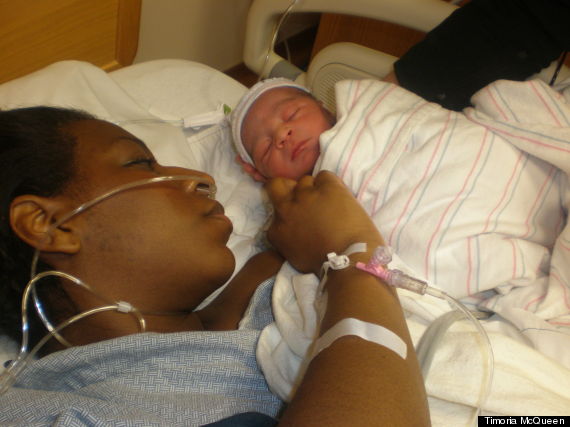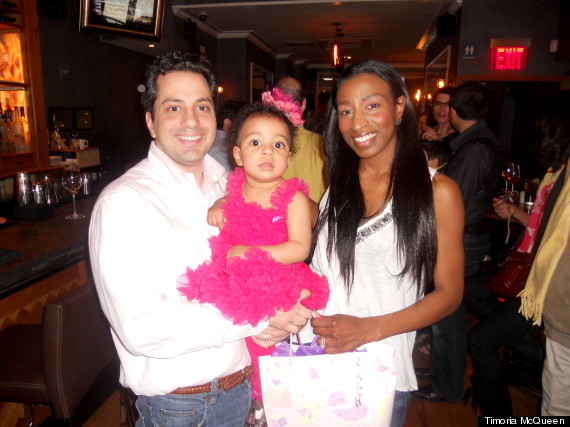Three years ago, just after giving birth to my baby girl, I started hemorrhaging. The doctors told me that they would try to save my uterus and ovaries, but if that was not possible, I would have to get a hysterectomy. Then, if the bleeding did not stop, I would die. What had been nine months of a drama-free pregnancy had now turned into a drama-filled nightmare.
I had a relatively easy, but long (twenty-seven hour) labor. Once I was ready, delivery was fast and easy -- I remember thinking it was almost too easy. Ten pushes and twenty minutes later, my beautiful daughter was born. As I held her in my arms for a few moments, I could feel a shift in the mood of the hospital room. Before I knew it, the serenity of the room was tainted by the sounds of warning beeps from the machines I was hooked up to and the room became flooded with strangers.
Enter emergency personnel. My husband and daughter were rushed out of the room and taken into the nursery. Blood was pouring out of my body as my life hung in the balance. After a three-hour surgery (during which I was fully conscious), I was in critical condition. Instead of staying in intensive care, my doctor fought for me to be reunited with my baby and my husband.
I was told not to move a muscle, which included nursing or holding my new daughter. I was awake all night in pain. Afraid to sleep, afraid to move, afraid that every breath I took might shake loose whatever was keeping me together. I stared at my daughter all night. Her big, round, brown eyes peered through the bassinet. I made a promise to her that I would be okay -- she would not be a motherless child. I survived and we went home five days later. Most of my friends thought I had a C-section because I was in the hospital for so long.

A few weeks later, I was diagnosed with PTSD (Post Traumatic Stress Disorder). Because of what had happened, I was afraid to leave the house. This was a very new feeling to me. Normally, I am very outgoing and my career as a professional make-up artist has afforded me the opportunity to travel all over the world. I have never been afraid to go anywhere! Now, when I did leave my home, I was easily startled and wrought with anxiety that something might happen to me, my daughter or my husband.
It became increasingly difficult to sleep at night. Every time I closed my eyes, I saw the blood and other reminders of the ordeal I had suffered after giving birth. Due to the demands of motherhood, I eventually pushed my feelings about what had happened aside. I was excited to be a mom and savored the days I spent with my baby. I challenged myself to get out of the house. I joined a hospital support group for new moms and signed up for "Mommy and me" baby music classes. As I met more new moms I felt a common bond among us as we talked about breastfeeding, sleep schedules and baby gear. We also shared intimate details of our lives that you would never think you would share with strangers. I made great friends through joining that group. Despite my outgoing nature and positive outlook on life, deep inside I felt like a victim of what was supposed to be a beautiful day. No one else I met had postpartum hemorrhaging and my feelings about the hemorrhaging and the surgery never went away. My emotions cycled through anger, guilt, fearfulness and sadness.
Whenever my daughter was napping, I would Google things like "PTSD" and "hemorrhaging after childbirth." I found very few resources for both. PTSD is often a diagnosis given to war veterans or victims of abuse. At the time, it was hard for me to comprehend how I now fit into that category. The most common mental health information in relation to motherhood that I found was about PPD (post partum depression). Although there were a few overlapping symptoms, I did not feel like I fit into that category either.
Supermodel Christy Turlington appeared on a morning news program a few weeks after my daughter was born. My mother-in-law was watching and called to tell me to tune in. Christy recounted her own story of having a postpartum hemorrhage after the birth of her first child, which led her to founding Every Mother Counts. Every Mother Counts is an organization dedicated to providing education and awareness to prevent maternal deaths. I felt an instant connection to Christy and have followed her organization ever since. I am so proud of the work that Every Mother Counts has done all over the world to educate people about maternal health.
What continues to shock me is the lack of resources, attention and education about maternal health here in the United States. Every year, 86,000 women in this country experience an emergency during childbirth and out of those approximately 700 die. As an African-American woman I was quite alarmed to learn that black women die three to four more times than white women after suffering a pregnancy or childbirth or complication. 98 billion dollars per year is spent by the U.S. on providing hospital care for pregnancy and childbirth yet the maternal death rate is more than double what is was twenty-five years ago. The United States currently ranks 50th in the world for maternal mortality . Can you believe that 49 countries are better at keeping new mothers alive than we are? Sad, isn't it?
I hope that by sharing my story, I can help bring some (much needed) attention to maternal health, PTSD and how the two can go hand-in-hand. Motherhood, in general, can be a very isolating experience, but when you suffer a trauma as a result of becoming a mother, it can be incredibly lonely. When I heard Christy Turlington Burns tell her story, I knew I was not alone. There are so many women who have experienced a traumatic birth and are looking for someone to talk to -- preferably, someone with a similar experience! However, resources are hard to come by.
I am proud to say that today I am feeling great! I am very active in my work and very involved in my community. Through therapy, I have learned that connecting with other women and sharing my story helps with my recovery. I have learned that it is okay to talk about my feelings and that they are honest and normal. Many women are embarrassed or fearful of being labeled "crazy" or "dramatic," or "unhappy in motherhood," which can cause them to avoid discussing their mental and emotional anguish.

I hope that those who have experienced birth trauma (or trauma of any kind) do not let the stigma of having a mental health issue prevent you from seeking professional treatment or sharing your feelings with a close friend or relative. If we want our government and health leaders to engage in a real and candid dialogue about maternal health and PTSD to provide more public awareness and education, it is up to us to do the same. Pregnancy and childbirth are unique and beautiful experiences. Talking about complications during this special time in a woman's life is uncomfortable, but the more we educate ourselves and discuss these issues, the more lives we can potentially save.
You can follow Timoria's journey at www.timoriamcqueen.com
